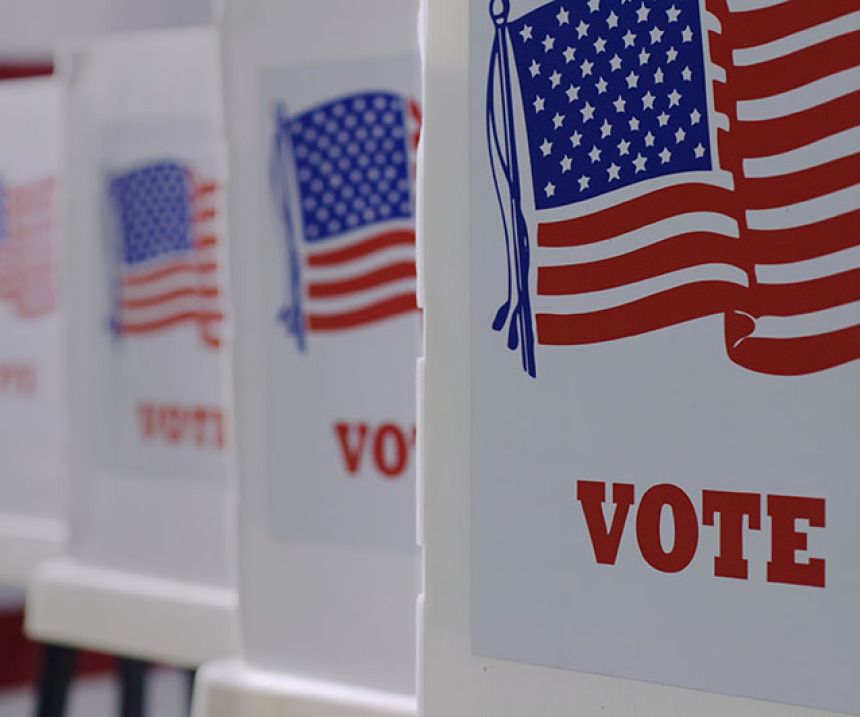Vote
Voting gives you the power to shape your community and is one of the most important rights of American citizens.
In every state except North Dakota, citizens must register to vote, and laws regarding the registration process vary by state.
Voting as a college student
As a college student, you can usually register to vote in either your hometown or where you attend college, depending on the residency requirements of your state.
Your voter registration is tied to where you live. As a college student, you can usually register to vote in either your hometown or where you attend college, depending on the residency requirements of your state. Keep in mind: You can live in more than one place, but you are only allowed to vote in one.
Choosing between your hometown or your college town
If you are going to college in a different city than your hometown, here are things you might consider when deciding where to vote:
- Which location is more convenient for you?
- Who is on the ballot in each place?
- Are there local policies or particular issues that are important to you in either place?
Where you register to vote may affect whether you qualify for in-state tuition.
Voting in your hometown
Even if you’re away at school for most of the year, you may have the option to vote in your hometown. Here’s what to keep in mind:
- Register to vote using your permanent address in your hometown. Use your college address as your mailing address on your registration.
- Many states allow you to ask for a mail ballot if you’re unable to vote in person. Some states mail every voter a ballot automatically. Each state has its own guidelines, so check to see what the rules are in your state or territory. You can have the mail ballot sent to your college address.
- If you will be in your hometown during the election, you may also have the option to vote in person. Use a polling place locator to find out where to vote on or before Election Day.
Voting in a different town in your home state
If you attend college in your home state or territory, but in a different town, you may have the option to vote there. Here’s what to keep in mind:
- If it’s your first time registering to vote, check the residency requirements for voting in your state. You may have to live in your college town for a certain amount of time before you can register there.
- After confirming your eligibility, you can register to vote using the street address of the building where you live, either on or off campus. Don't use a campus mailbox address to register, but you can use a campus mailbox as your mailing address. If you're not sure what address to use, contact your school’s civic engagement office or the local election office.
- If you are already registered to vote in your hometown, update your voter registration with your college address. For more guidance on which address to use, contact your local election office.
- If you are able to travel to your hometown during early voting or on Election Day, use a polling place locator to find out where to vote.
Some states allow you to ask for an absentee or mail ballot if you’re unable to vote in person or would simply prefer to vote by mail. - Some states hold elections entirely by mail. Each state has its own guidelines, so check your state or territory’s rules.
Voting in your college town out of state
If you attend college in a state or territory that is different from your home state, you have options to vote there. Here’s what to keep in mind:
- In some states, you must live in the state for a certain number of days before you can register to vote there. Check the residency requirements for voting on the election office website in your college state.
- After you confirm your eligibility, register to vote in your college state. You can register to vote using the street address of the building where you live, either on or off campus. Don't use a campus mailbox address to register, but you can use a campus mailbox as your mailing address. If you're not sure what address to use, contact your school’s civic engagement office or the local election office.
- Are you already registered to vote in your home state, but you want to change your registration to your college state? Most counties and states do not require you to cancel your voter registration after you move, but doing so helps your local election officials. Many state and local election offices have forms you can submit to cancel your registration. Find your state or local election office to get voter cancellation forms.
Already registered to vote? Check your registration to make sure.
No matter where you're from or where you plan to vote, you can learn how to register at Vote 411 Registration.
Registration deadlines
There is no national voter registration deadline. In some states, the last day to register is 30 days before Election Day. In other states, you can register on Election Day. Election Day refers to any election (local, state, or a national election). See your state's voter registration deadlines
Different states have different ID requirements. Check to see if you need to bring your driver’s license or another form of ID so you aren’t prevented from voting. See your state's ID requirements
You can get an ID card at your state motor vehicle office, even if you do not drive. You will need to pay to get an ID card, but there are organizations that may be able to help you with ID-related fees.
You do not need a voter registration card to vote.
Every person is assigned a polling place based on where they live. Find your polling place
Many states offer absentee, mail-in voting, or in person early voting options. See what's possible in your state
Learn how your vote affects your community so you can make an informed decision.
Many election offices post sample ballots online. Some also provide information online or by mail about candidates and ballot measures. Check your state or local election website for more information.
See what’s on your ballot at Vote 411 Voter's Guide.
Support your community by becoming a paid poll worker. Poll worker duties are different depending on where you live. Many local election offices have poll workers do tasks such as:
- Set up a voting location
- Welcome voters
- Confirm voter registration
- Hand out ballots
- Help voters use voting equipment
- Explain voting procedures
As a poll worker, you will be paid for your time. Pay varies depending on location. Learn more about how to become a poll worker
Quick facts
Vote in Minnesota
You're eligible to vote in Minnesota if you're a U.S. citizen, at least 18 years old on Election Day, and have been a resident of Minnesota for at least 20 days. Paying out-of-state tuition or having a driver's license from another state does not necessarily mean you can't vote in Minnesota.
- Voter Registration Deadline: To be determined
- Mail-in Ballot Application Deadline: To be determined
- Mail-in Ballot Submission Deadline: To be determined
- College Students Fact Sheet
- Election Website
Vote in North Dakota
- Voter Registration Deadline: Not required, but need to have a valid form of ID
- Mail-in Ballot Application Deadline: To be determined
- Mail-in Ballot Submission Deadline: To be determined
- College Students Fact Sheet
- Election Website
Vote in South Dakota
- Voter Registration Deadline: To be determined
- Mail-in Ballot Application Deadline: To be determined
- Mail-in Ballot Submission Deadline: To be determined
- College Students Fact Sheet
- Election Website

Your vote is your voice
Voting rights
Visit ACLU to learn about how to exercise your voting rights, resist voter intimidation efforts, and access disability-related accommodations and language assistance at the polls.
Voting problems? Call or text the nonpartisan Election Protection Hotline at 866.OUR.VOTE (866.687.8683).
